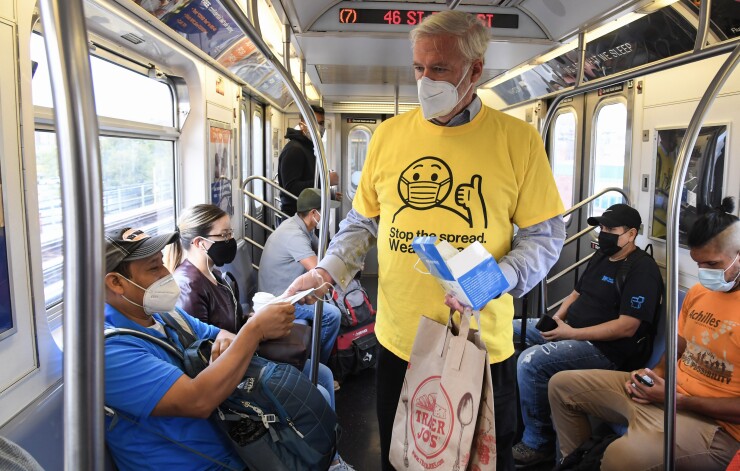Bleeding millions weekly from the effects of COVID-19 and with no further federal aid in sight, New York’s Metropolitan Transportation Authority may tap into the remaining $2.9 billion available to it from the Federal Reserve’s short-term lending facility.
By pledging payroll mobility tax revenues against the borrowing from the Municipal Liquidity Facility, the authority could get a 1.8% interest rate, MTA board finance committee chairman Lawrence Schwartz said at Wednesday’s monthly meeting.

“That is the cheapest money that the MTA will ever be able to get as a loan,” he said.
The MTA last month sold $450 million of transportation revenue bond anticipation notes to the Fed at 1.93%, after rejecting bids from banks in the open market. MTA officials said the move saved the authority $12 million.
The state-run MTA, which operates New York City’s mass transit system and already has about $45.6 billion of debt including special credits, projects deficits of $10 billion through 2021 and $16 billion through 2024.
Given that the MTA wants $12 billion more from Washington, maxing out on the Fed program could provide a bridge of sorts.
“Borrowing $2.9 billion and change through the MLF and accessing that facility is obviously helpful, but for an agency that spends nearly $300 million a week, that is obviously not a long-term solution,” Chairman Patrick Foye told reporters.
By law, the MTA must enact a balanced budget by year’s end and by bond covenants cannot file for bankruptcy. MTA officials have warned of doomsday service cuts of 40% to 50% on subways, buses and commuter rail and possibly steep fare increases as soon as November.
Deficit financing aside, the authority has enough liquidity to run through the first quarter of 2021, according to Chief Financial Officer Robert Foran.
Shutdowns and stay-at-home measures to counter coronavirus have pummeled its revenue sources and Congress is deadlocked over further rescue aid.
“Our calls for federal assistance have fallen on deaf ears,” Schwartz said, adding that federal instability could extend past the presidential election. “The sad reality is we’re not going to know before the November election or maybe not until sometime early in 2021 whether we’re going to get any help from Washington, and how much that’s going to be.”
The payroll mobility tax, which New York State enacted in 2009 as part of an MTA bailout, and which has withstood several legal challenges, is imposed on the payrolls of employers and the net earnings of self-employed persons working within the MTA coverage area, which includes the city's five boroughs, Long Island's Nassau and Suffolk counties, and upstate Westchester, Orange, Putnam and Dutchess counties.
Moody’s Investors Service two weeks ago downgraded the MTA’s primary transportation revenue bond credit to A3 from A2 in the latest hit to the authority from Wall Street. The move came ahead of the MTA’s sale of $900 million of transportation revenue bonds in three tranches, with offerings of 25, 28 and 30 years.
Both Schwartz and Foran said that under the Fed’s flexible terms that include no prepayment penalty, the MTA could pay off the debt early if it receives a federal package.
“The highly uncertain outlook for additional aid from the federal government helped drive the timing of the downgrade as well as the maintenance of a negative outlook,” municipal bond analyst Joseph Krist said.
Spreads were significantly higher for the most recent sale, Foran told board members. Bids came in 277 to 295 basis points above the Municipal Market Data index.
“Historically, pre-pandemic, we were trading probably 40, 45 to 65 basis points over MMD,” Foran said. “We appreciate the markets’ support for capital program but it is expensive given our dire financial straits.”
The all-in true interest cost for the entire $900 million sale, he added, was 4.49%.
“It is logical for the MTA to look for less expensive sources of credit,” said Rachael Fauss, a senior research analyst for the good-government group Reinvent Albany. “If the MTA seeks to access the MLF, it should work with federal partners, including Sen. {Chuck] Schumer, to access even lower interest rates.”
Schumer lobbied for MTA access to the facility, which Gov. Andrew Cuomo granted. The maximum available is about 20% of 2019 revenue.
Only the MTA and Illinois, the lowest-rated state, have used the facility amid
“We’d like to see it extended beyond 12/31,” Foran said.
According to data on the Municipal Securities Rulemaking Board's EMMA website, a block of Series 2012-B transportation revenue bonds maturing in 2039 that originally priced at 97.608 cents on the dollar and a 4.25% coupon sold to a customer Wednesday at a price of 101.25 cents and a 4.378% yield.
The authority has used up its $3.9 billion allocation under the federal CARES Act. Gridlock in Washington could well extend indefinitely, with Foye citing the latest distraction — a bitter fight over a U.S. Supreme Court seat vacated by Friday’s death of justice Ruth Bader Ginsberg.
“The MTA faces an existential threat where enfeeblement is the short-term risk and extinction the worst-case scenario,” Foye said.
MTA officials and transit advocates have stressed its importance to the economy of the region, state and by extension, the country. Wednesday’s public speaking session included testimony from regional mayors, national contractors and chambers of commerce from Manhattan to the North Country, which abuts the Canadian border.
“You’re not just hurting New York State, you’re hurting Kansas, Nebraska, Illinois, all over the place,” board member Andrew Albert said on a
“Just about every state, including Kentucky, is benefiting,” said Lisa Daglian, executive director of the watchdog Permanent Citizens Advisory Committee to the MTA, referring to the home state of Senate Majority Leader Mitch McConnell.
“We’re talking about service cuts that would make the 1970s look like a drop in the bucket.”





